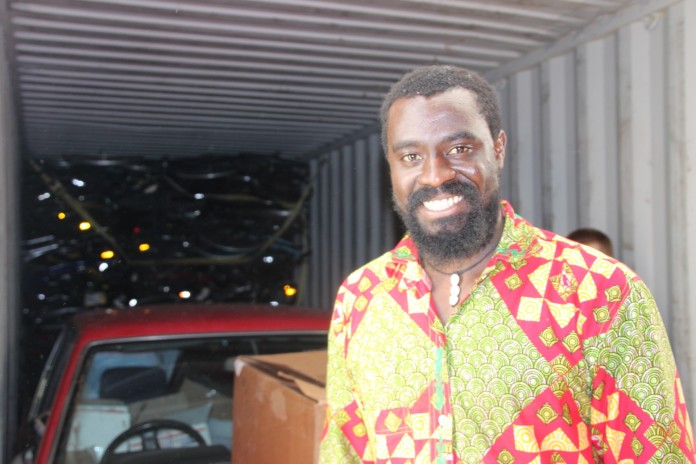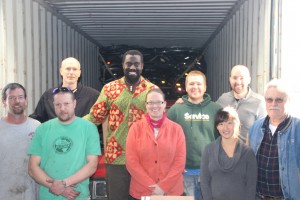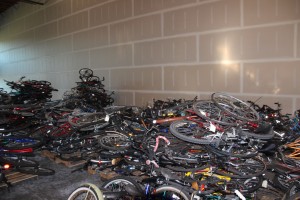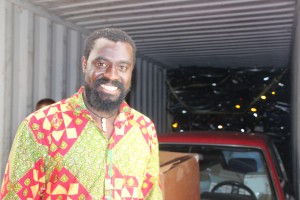
By Tom Rohrer
 It’s easy to take for granted the technological advancements we have in the United States. Take, for instance, bicycles. Certainly, many Thurston County commuters travel by bike for both transportation and recreation. But does our education and future career depend on whether we own a working bicycle? Not likely.
It’s easy to take for granted the technological advancements we have in the United States. Take, for instance, bicycles. Certainly, many Thurston County commuters travel by bike for both transportation and recreation. But does our education and future career depend on whether we own a working bicycle? Not likely.
The citizens of Togo, a sub-Saharan nation in West Africa, rely heavily on bicycles.
“There is no way to truly explain, to modern children, the impact a bicycle can have on someone’s life in Togo,” said Olowo-n’djo Tchala, the Co-Founder of Alaffia, an Olympia based body-care company which sources Shea butter from West Africa to produce their products. “I know from my own life.”

Tchala was born and raised in Togo and eventually met his wife Rose Hyde in the village of Kaboli while she was visiting the area as a Peace Corps volunteer. In 1998, Tchala would follow Hyde to the United States, and after Tchala’s graduation from the University of California-Davis, would re-locate to the Steamboat Island peninsula in 2004.
That same year, the couple began filling a trailer on Steamboat Island with donated and scavenged bicycles and bicycle parts. With the experiences from growing up in Togo ingrained in his head, Tchala wanted to be able to provide the country’s rural female population with a mode of transportation to get them to and from educational opportunities.
“Instead of taking buses like children here, girls in Togo are walking seven miles to school and eventually they drop out,” said Tchala, who founded Alaffia with his wife. “Imagine seeing two young, beautiful ladies who know they have no future. What we are doing is giving a chance and an opportunity to someone.”
On Wednesday, Nov. 20, at a warehouse in Lacey, Tchala, Hyde and several others loaded around 450 bicycles and a pickup truck in a traveling container that will arrive in Togo about seven weeks from today. The container will be shipped out of the Port of Tacoma before its global journey by sea.
Including this shipment, Alaffia will have gathered and shipped 5,400 bicycles since 2006.
To obtain the large quantity of bicycles, Alaffia has branched out to different organizations and has also held community bike drives throughout the community.
“(The bicycles) come from individuals and drives we host in downtown Olympia,” said Ian McGregor, Alaffia’s Communications Director. “The police departments donate as well and we will also partner with retail stores.”
“A lot of these bikes would be scrapped or would hang out in garages building up mildew,” said Hyde. “They’re being recycled and re-used. Sustainability is what [Alaffia] is all about.”
According to Tchala and Hyde, a staggering 90 percent of women in Togo drop out of school before graduating and continuing their education.

“These girls, living in rural communities, have a lot of duties and chores as it is, and without a mode of transportation, they don’t have enough time for education to be an option,” McGregor reported.
This lack of sufficiently educated women has contributed to the economic difficulty found not just in the nation, but throughout Africa.
“A majority of women in Togo don’t participate in economic activity. We cannot get out of poverty if half of the population is not working on economic activity,” says Tchala. “Overall, it’s a huge deal. But to achieve and improve, it’s a ‘one person at a time’ process.”
“Africa has all these resources, but is the poorest continent. To get out of poverty, we need to have a destiny in resources,” Tchala continued. “To have a destiny in resources, you need to understand the world, and if you don’t go to school, you won’t learn about resources.”
“Imagine a young lady with a bicycle. She now has a sense of freedom, and she can go anywhere with that,” he summarized.
The project does not stop once the hundreds of bicycles arrive in Togo. Alaffia keeps tabs on the individuals who obtain the bikes. Free bicycle repair service is also provided.
“We want to see where these women go in life. How many go on to universities? What do they do after? What are their aspirations?” noted McGregor. “These are all things we can keep track of.”
“We visit each village and make sure we maintain [the bikes],” Tchala says. “We don’t want to give them something and walk away. Also, we don’t want to take their money away for parts.”
Through this mechanic service and using material from the nation in their products, Alaffia has been able to provide sustainable jobs. The company also uses American made goods, creating jobs locally as well. Around ten percent of the company’s profits are donated to the advancement of West African women’s education and towards helping the South Sound community.

“Essentially, our ultimate goal is that this model won’t help just West Africa, but the USA and the rest of the world as well,” Tchala says. “There are 8 billion people on earth. We all need to pay attention and share. We can’t throw a blind eye at a place.”
Along with the adult sized bicycles that are shipped to Togo, Alaffia receives hundreds of children’s bikes as well. Alaffia is focusing on outfitting adults in Togo and space is limited on shipments. The children’s bikes are donated to South Sound families in need. It’s part of Alaffia’s way of giving back to their home base of operations, an area that has given the company their support.
“I think [the donations Alaffia receive] shows the humility of the community but also shows to me that it doesn’t matter how far away we are, we as humans do care and are moral beings,” Tchala said. “It’s a sense of caring and shows goodness that we can help and support each other.”
“We want to give thanks to the community of Puget Sound for any support they give our organization,” he continued.
What’s next for Alaffia? McGregor noted he has been in contact with the Boys and Girls Clubs of Thurston County and Hyde says the company is in discussion with local schools on possible programs.
Tchala will be visiting Togo in early December, one of about four trips annually oversees.
Standing in the warehouse in the process of helping his home country, Tchala was asked if he ever thought he could make such an impact on the communities he loves.
“Never…never would that come to my mind,” he says. “I’m very fortunate and grateful at same time.”
So too are we, Mr. Tchala.
















































